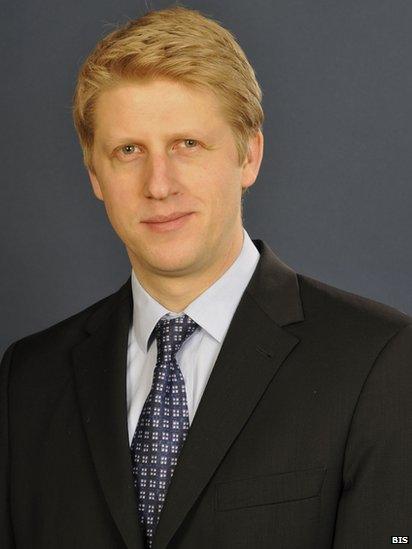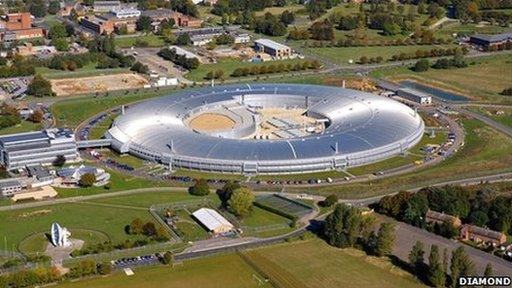Science minister signals shift towards 'one nation science'
- Published

Critics of the present system of science funding say it's rather like modern football where the richest clubs are the most successful, which makes them even richer enabling them to continue to be successful.
The largest universities get the bulk of the funds because that is where the best research is conducted. But that means that they continue to thrive while the rest are left in their wake. It also means that new high-tech industries tend to base themselves around the large universities which tend to be in the South East of England.
Research funding is distributed by scientific experts, who are independent of ministers. They do so on the basis of the quality of research and the strength and reputation of the research group. This tried and tested formula has seen the emergence of some of the world's highest ranking research universities.
It has also meant that the UK leads in many areas of science. With less than 1% of the world's population the UK produces 16% of top quality published research.
The new Science Minister, Jo Johnson, has signalled there may be a shift in research funding.
In his first major policy speech, external Mr Johnson has indicated that research funds could in future be distributed more widely across the UK. Currently nearly half of public science spending is concentrated in Oxford, Cambridge and London. He also indicated that there would be more emphasis on research to drive growth.
He chose to make his announcement in the north of England. Addressing an audience at the Rolls-Royce Factory of the Future, which is part of the University of Sheffield's Advanced Manufacturing Research Centre, he described his new strategy as "one nation science".

Science Minister Jo Johnson wants to develop s science strategy that benefits the whole country
"The fact is, 46% of public investment in research goes to the Golden Triangle (internationally renowned universities in London, Oxford and Cambridge). We must and we will continue to fund research on the basis of excellence and ensure we are competing with the very best in the world," he said.
"But we do have to ensure we recognise that other parts of the country that have proven research excellence in their universities, and ensure we fund excellence wherever it is found in order to realise the productivity gains that we have seen in the Golden Triangle. To achieve this we need a new approach - one that promotes and protects our reputation for world-class science, and also drives growth and raises productivity for the whole of the UK."
Equitable
A shift in research funding would see what some would argue as a more equitable distribution of public money for research and aid in economic regeneration in other parts of the country. Such a plan would fit in with Chancellor George Osborne's plan to develop a "northern powerhouse".
Mr Osborne signalled his intent during the previous coalition government when he pledged £235m for a graphene research centre in Manchester.
Graphene is a relatively new type of material that some believe will lead to innovative electronic products. Critics at the time argued that the centre should have been based in Cambridge, which has a world-class materials research centre.
There was also concern that such decisions were being made by ministers to fund their own "pet projects".
Mr Johnson was at pains to stress that, although following in the same vein, his new approach would be more formalised and more transparent.
He has asked officials to work with local areas to audit local research and innovation strengths and infrastructure.
"These [audits] will provide a new way to identify and build on areas of greatest potential in every region," he said. They will be "open and transparent".
Such an approach seems to have won the cautious endorsement of the president of the Royal Society, Sir Paul Nurse.
"The science budget needs to be invested in the best science, wherever it is, but there is a strong economic case for investing regional development cash in the best research in different parts of the UK. This cannot be a case of excellence versus location - what is required is greater public and private investment in science so we can have both, " he told BBC News.

Research funding in the UK
120 universities and other academic institutions receive public funding to the tune of £2.7bn
The top four (Oxford, UCL, Imperial and Cambridge) receive a third of that, receiving around £200m each
Top 10 universities receive half of all research funding
The top 20 universities get 70% of all research funding
The Golden Triangle (Oxford, Cambridge and London's UCL, Imperial and King's) receive 35%
Source: Higher Education Funding Council, Research Councils UK

Pragmatic
There is concern among some senior researchers at Oxford, Cambridge and London that not only will they lose out, but that economic development will drive science spending at the cost of funding the highest quality research - notably theirs.
Others though acknowledge that this is a risk but take a more pragmatic approach. One senior scientist involved in funding told me that this strategy was probably the best way of maintaining high-quality research.
"It's not a case of shifting money from Cambridge to Manchester," he said. "But potentially it is a way of getting money we otherwise might not have otherwise from other pots in government."
Naomi Weir, the acting director of the Campaign for Science and Engineering, said: "Shifting around investment within the science budget without increasing its spending power will not deliver the scale of success government wants and the UK needs in terms of discovery, innovation, productivity and jobs."

The UK boasts some of the best research facilities in the world, such as the Diamond synchrotron (a type of particle accelerator). But can we stay ahead?
Another respected and highly influential scientist said that there needs to be more of a "conversation" between the scientific community, government and the public. And this need not be at the cost of high-quality research - "quite the opposite", he believes.
Money is the bottom line for the great and the good of the science world that I spoke to. While many are perturbed by the noises that seem to be emerging from the government, they know that the chancellor is having to consider making deep cuts to government expenditure.
So far science has been relatively protected. The chancellor agreed to save it from the axe in 2010 and its budget has remained frozen and protected. But it has been eroded by inflation over the past five years and so even in this privileged position the heads of the UK research funding councils are having to consider cutting high-quality research.
By playing the economic development card science leaders hope they can avoid the cuts and may be able to squeeze a modest increase from the chancellor.
Follow Pallab on Twitter, external
- Published3 December 2014

- Published29 November 2011
- Published21 November 2013
